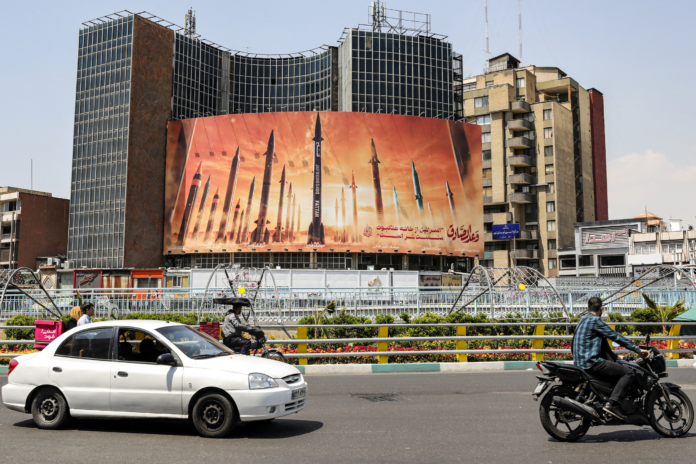If ever there was a red line, Iran crossed it Saturday, launching more than 300 drones, ballistic, and cruise missiles into Israel from its own territory. The Israeli, British, U.S., and Jordanian militaries united to shoot down 99 percent of Iran’s projectiles. But the precedent has been set.
Tehran said it had to take revenge. Israel had just assassinated a top Islamic Revolutionary Guard Corps (IRGC) general along with other commanders. Supreme Leader Ali Khamenei apparently decided that doing nothing would show weakness, signaling that Israel could attack its leaders with impunity. Yet, he must have been aware that the course he had chosen risked provoking a larger conflict, especially one involving the United States.
Iran’s preferred tempo is a slow burn. Its default strategy is to wear Israel down through a war of attrition via its proxies in Lebanon, Yemen, Iraq, Syria, and the Palestinian territories. Why was its government emboldened to act directly this time?
Motorists drive their vehicles past a billboard depicting named Iranian ballistic missiles in service, with text in Arabic reading “the honest [person’s] promise” and in Persian “Israel is weaker than a spider’s web,” in Valiasr… Motorists drive their vehicles past a billboard depicting named Iranian ballistic missiles in service, with text in Arabic reading “the honest [person’s] promise” and in Persian “Israel is weaker than a spider’s web,” in Valiasr Square in central Tehran on April 15. More ATTA KENARE/AFP via Getty Images
Part of the answer lies in the White House. Iran’s leaders apparently assumed that if they struck Israel with weapons they knew could be intercepted and sent a clear message that the attack would end if Israel didn’t respond, the U.S. would pressure Israel against retaliating. That assumption proved correct.
Less than 12 hours after Iran launched its first drone, President Joe Biden publicly suggested that Israel’s “remarkable capacity to defend against and defeat even unprecedented attacks” was a sufficient reaction, while privately expressing concern that Israeli Prime Minister Benjamin Netanyahu would drag the U.S. into a wider war. Biden told Netanyahu that the U.S. would not support an attack on Iran and that Israel should “take the win” of having blocked 99 percent of the drones and missiles.
But the idea that mere interception is a victory is not just wrong but dangerous. By striking Israel directly, Iran set a perilous precedent. If Israel does not respond forcefully, the Jewish State and other U.S. regional allies could invite future Iranian missile barrages.
Iran did some concrete harm with its attacks. Shrapnel seriously injured a 7-year-old girl and Israelis were terrorized for several hours while Israel was forced to spend over a billion dollars to defend against the strikes.
Prior to the attack, Israeli officials warned Iran that a direct strike would elicit a direct response. After the attack, Israeli Foreign Minister Israel Katz said this equation had not changed. Israeli war cabinet member Benny Gantz added that Israel would “exact a price from Iran in a way and time that suits us.”
“If this government does not understand its responsibility to restore the element of deterrence and respond with an attack against Iran, it is endangering the future of the state of Israel,” said Israeli Knesset member Tally Gotliv.
An Israeli response could take several forms.
An unnamed security expert told the Israeli newspaper Maariv last week that Israel may use an electromagnetic bomb for the first time ever in central Iran, including targets near nuclear facilities. The bomb, which uses electromagnetic pulses, is not lethal, but could temporarily shut down Tehran’s electrical and communication infrastructure.
Similarly, Israel could launch a cyberattack on Iran’s energy, civil, and military infrastructures. Such an attack could disrupt Iran’s military and economic functions, or even disable them for several days.
But such responses would be unlikely to shake Iran’s confidence or deter similar future attacks. Former U.S. National Security Advisor John Bolton encouraged Israel to take advantage of the tensions to take out Iran’s nuclear program. Iran is just a week away from enriching uranium to the 90 percent level needed for a bomb, according to the Institute for Science and International Security. If it proceeds and builds a nuclear stockpile, it will act as a force multiplier, intimidating the rest of the region. Yet if Israel can destroy Iran’s nuclear program, which is not clear, it would face staunch pushback from the Biden administration.
A more proportional response could take out Iran’s launch sites and weapons warehouses. However, this would force the Israeli air force to refuel in midair, which it cannot do without U.S. assistance. It is extremely unlikely that the United States would support such an operation.
Alternatively, Israel could attack IRGC sites outside of Iran in Syria or Lebanon. However, such strikes outside Iran would only project weakness.
If Israel’s response is weak, it will show that its dependence on Washington has once again hindered its response to a vital security threat. It is likely that Washington will require certain stipulations that would hinder an Israeli counterstrike while also demanding a quid pro quo for helping shoot down missiles and drones in the form of concessions in Gaza. In short, Jerusalem will pay a price for U.S. protection.
This episode reflects the general erosion of U.S. security pledges to allies. In the Middle East, in particular, American deterrence is at its weakest since former President Barack Obama warned Syrian President Bashar al-Assad that using chemical weapons would be a “red line” triggering a U.S. response, and then balked after Assad crossed that line. Preceding the recent Iran attack, Biden warned Tehran not to strike Israel and rallied other regional leaders to warn the ayatollahs as well.
At the same time, Washington privately told Tehran through Turkish diplomats to keep the attack “within certain limits,” essentially giving the ayatollahs the go-ahead. This is part of a pattern of incoherent U.S. foreign policy that encourages belligerence from enemies such as Iran, Russia, and China.
Should Israel choose to conduct a significant response, it will likely do so alone. This wouldn’t be the first time. After Israel destroyed Iraq’s unfinished nuclear reactor in 1981, Jeane Kirkpatrick, then President Ronald Reagan’s ambassador to the United Nations, condemned the strike in the harshest terms, equating it to the “brutal Soviet invasion of Afghanistan.”
However, such an operation is unlikely. Israel under Netanyahu has become much more dependent on Washington and much less daring in its operations.
There is a lot of blame to go around for Saturday’s attack. Iran has been emboldened by a Biden administration that has continuously sought appeasement as well as by an Israeli security establishment that has refused to hold Tehran directly accountable for the actions of its proxies.
At the same time, the fact that the United States, France, the United Kingdom, Jordan, and Saudi Arabia all came together to thwart the Iranian attack is a sign that the region and the West will stand together against Iranian belligerence. This represents one of the largest successes of U.S. foreign policy in the Middle East over the past 20 years.
Iran has warned that any response from Israel will elicit an even larger counterstrike. Tehran only used a small percentage of its arsenal in Saturday’s strike, and Hezbollah only fired off an almost symbolic number of Katyusha rockets. Should Iran and Hezbollah join in a wide-scale strike on Israel, the results could be devastating. But in the long run, not responding forcefully would be far worse.
Iran would prefer to go back to the old paradigm of trying to destroy Israel slowly and by proxy.
But will Israel continue to tolerate that?
Joseph Epstein is the director for legislative affairs at the Endowment for Middle East Truth (EMET) and a fellow at the Yorktown Institute.
The views expressed in this article are the writer’s own.




